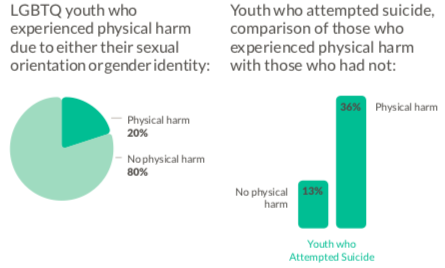News Commentary
A new study on LGBT youth and mental health has been released by the Trevor Project, a U.S. based LGBT youth advocacy group.
In this survey there are as many trans-identified youth as gay and lesbian youth or bisexual youth. This is unprecedented in earlier suites on the LGBT population.
This study shows that both trans youth and LGB youth report high rates of suicide ideation and attempts, as well as discrimination. The rates are higher for trans youth.
Youth who report having people try to change their sexual orientation or gender identity report worse mental health. GHQ does not support rejecting trans youth or diminishing their gender dysphoria issues. We support a mental health model and worldview that doesn’t consider inappropriately transitioned minors and young adults as morally acceptable collateral damage.
It is very important to protect LGBT youth from bullying and physical violence. This is not the only study that shows an association with poorer mental health and suicide risk and bullying.
There are some aspects of this study that have a negative impact on the quality of it:
1) It is gathered on social media websites so it is a survey study, not population based. These may yield questionable results.
2) This study as published online has a major shortcoming in that it does not break down biological sex, not by gay or lesbian, and not by trans-identified biological females relative to males.
2 studies reveal that having a biological sex of female verses male may be what is actually driving the highest suicide risk rates rather than “cis” versus trans. The recent Toomey 2018 study in the US and a Stonewall UK study are reviewed here pointing out that reality.
Recent data is showing large increases in numbers of females who identify as trans, as well as large increases in females with serious mental health problems. Biological sex is a very relevant factor in this research. Scientists should display this information clearly in studies and take it into consideration when analyzing data. It is actually an odd oversite that it is not included in the Trevor Project Study and other recent LGBT studies.
3) The study does not break down the mental health of gay, lesbian, and bisexual youth or of trans versus non-binary-identified youth. These are different populations. For example, many studies show bisexuals have worse mental health problems than gays or lesbians. They may have as many mental health problems as trans people do. Not isolating this population was a missed opportunity to communicate with the public what these young people are experiencing. It’s one of several negative side effects arising from constantly lumping all “LGBT” people together. These populations all show differing profile averages in mental health, physical health, and income.
4) There are multiple questionable identities like “demi-boy” and “ace-spectrum” lumped in with LGBT youth which appear to reflect online Tumblr youth culture rather than clear data collection.
A previous blog post about two females who obtained nippleless double mastectomies raises the topic about whether or not minors will receive sugeries for non-traditional medical transitions. These are for identities such as agender, nullo, or neutrois, which are identities where the person wishes to be no gender or sexless and may remove nipples, the whole penis, or have the vagina sewn up and clitoris removed. These identities technically fall under non-binary identities which are being medicalized in children under the age of eighteen. Here in the list of the Trevor Project identities is “Neutrois.
Update 06/24/19: A recent news article “Almost 2 percent of high schoolers say they are transgender” about a CDC study shows it has similar results to the Trevor Project survey. It demonstrates drastic increases in numbers of trans-identified teens, and that they have much higher suicide risks rates
We do not have open comments on the Gender Health Query website. But that doesn’t mean we aren’t interested in what you have to say. If you have a comment, blog post idea, or any other feedback, we would be interested if the information can be supported by science research, an informed opinion, real-world observations, or personal experiences. Please contact us.










